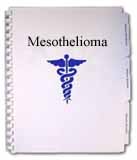|
Mesothelioma and Lung Cancer News - Return to Menu
Exposure to North
Dakota Road Material May Increase Risk of Lung Cancer
ScienceDaily
(Dec. 28, 2010) � New data shows
that people exposed to the mineral erionite found in the gravel of road
materials in North Dakota may be at significantly increased risk of developing
mesothelioma, a type of lung cancer most often associated with asbestos
exposure, according to research presented at the 2010 Chicago Multidisciplinary
Symposium in Thoracic Oncology.
This symposium is sponsored by the
American Society for Radiation Oncology (ASTRO), the American Society of
Clinical Oncology (ASCO), the International Association for the Study of Lung
Cancer (ISLAC) and The University of Chicago.
Erionite is a mineral that occurs
naturally and is often found in volcanic ash that has been altered by weathering
and ground water. Erionite forms brittle, wool-like fibrous masses in the
hollows of rock formations. Its color varies from white to clear, and it looks
like transparent, glass-like fibers.
With similar properties to asbestos,
erionite may pose health risks to those who breathe in the fibers. Erionite
exposure has been associated with an unprecedented mesothelioma incidence in
some Turkish villages in Cappadocia, and it has been widely believed that
exposure to erionite was limited to that part of the world.
Erionite deposits are present in
several parts of the U.S., including California, Oregon, North Dakota, South
Dakota, Arizona and Nevada. In North Dakota in particular, researchers have
found that more than 300 miles of roads were paved with erionite-contaminated
gravel over the last 30 years.
In this study, funded through NCI
PO-1 "Pathogenesis of Mesothelioma" and a AACR Landon Innovator Award
for International Cancer Research, international researchers from the U.S.,
Italy and Turkey sought to examine the potential health risks for those exposed
to erionite by comparing air samples, microchemistry, tissue samples and other
data from North Dakota with those found in affected parts of Turkey.
"Based on the results of our
study and considering the known latency period for lung disease, there is
concern for increased risk of mesothelioma for exposed residents in North
Dakota," Michele Carbone, M.D., Ph.D., lead author of the study and
director of thoracic oncology at the University of Hawaii Cancer Center in
Honolulu, said. "Precautionary measures should be undertaken to reduce
exposure of erionite that is occurring in North Dakota and may be occurring in
other areas of the U.S. where large deposits of erionite are present if
disturbed. Our findings provide an opportunity to implement novel preventive
and early detection programs in the U.S., similar to what has been done in
Turkey."
The abstract was titled,
"Erionite Exposure in North Dakota is Comparable to That Found in Turkish
Villages Which Experience a High Incidence of Mesothelioma."
Urgent Ban on All
Asbestos Needed, Experts Urge
ScienceDaily
(Dec. 9, 2010) � Scientists at the Collegium
Ramazzini in Modena, Italy have repeated calls for a total ban on all asbestos
across the globe. Writing in the International Journal of Environment and
Health, the Collegium points out that just 52 nations have banned asbestos
but a large number still use, import and export asbestos and
asbestos-containing products.
Asbestos can refer to any of six
naturally occurring fibrous minerals, serpentine asbestos, also known as
chrysotile or white asbestos accounts for 95% of all asbestos use. The
amphibole minerals: amosite (brown asbestos), crocidolite (blue asbestos), and
tremolite, anthophyllite, and actinolite, are no longer used. Asbestos can
withstand fire, heat and acid, is strong and insulates against heat and sound.
But, it is a potent cancer-causing material account for 5-7% of lung cancers in
men internationally and effecting the health of millions.
Despite the fact that there are now
synthetic alternative that are much safer than asbestos, white asbestos is
still mined and exported to the developing world, most notably by Canada, which
has come under fire from the medical journal The Lancet for the alleged hypocrisy
of having banned asbestos use in Canada but continuing to export the lethal
material. The Collegium points out that exemption of white asbestos from any
ban has no basis in medical science.
To protect the health of all people
in the world -- industrial workers, construction workers, women and children,
now and in future generations, a total ban, rigorously enforced, is urgently
needed, the Collegium says.
At least 125 million people around
the world are today exposed to asbestos through their work with about 20 to 40%
of adult men reporting past occupations that may have exposed them to the risk
of mesothelioma, asbestos, and lung cancer due to asbestos.
|

































